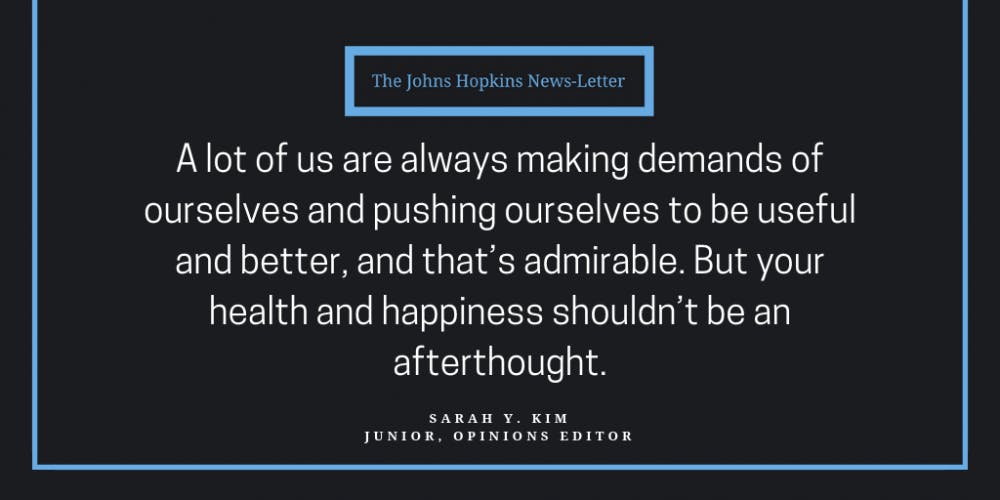This year, I’ve gotten better at taking care of myself.
For me, a lot of this means allowing myself to slow down. I set aside time to cook. I eat healthier and take my time at meals. I go to the gym. I sleep a lot more and avoid staying at Brody past midnight. On weekends I try to spend time with friends and do something relaxing to refuel me for the coming week: watch a movie, go grocery shopping, try a new restaurant. Most importantly, I give myself time alone to unwind and recharge.
The notion of “self-care” goes against a lot of my instincts. I grew up in South Korea, a country that takes pride in its efficiency and academic rigor but is also notorious for its high suicide rates — particularly among students who crack under the pressure to succeed. I now go to Hopkins, an institution with ill-equipped mental health resources and alarmingly high rates of depression, where people talk loudly about how they’ve forgotten to eat or pulled three all-nighters in a row. In the past couple of years I sometimes took a sick pride in hurtling from commitment to commitment, sleep-deprived and constantly occupied, not having the time to examine what I really felt, thought or wanted.
For some of us, self-care might seem a bit wishy washy. We may confuse it with self-indulgence, with laziness and selfishness. It’s proliferated social media and has been hashtagged to the point where it may seem like another passing, superficial trend.
On surface level, the idea of taking care of your health may also seem pretty straightforward. It’s about taking care of your physical and mental health. Whatever is there to discuss, you may think.
Or maybe you’re a man, and you think self-care is beneath you. Maybe as a man you’re annoyed with the way we women keep prattling about self-care. Women might have the leisure time to wallow in self-pity and do their dumb skin care routines, but heck, you have more important things to do.
But there’s more to self-care than meets the eye.
I was struck by a quote I read from American writer Audre Lorde on self-care, a quote that resonated with women long before “self-care” took over the internet. She said: “Caring for myself is not self-indulgence, it is self-preservation, and that is an act of political warfare.”
As a black queer feminist, Lorde recognized self-care as a way of surviving in a racist, homophobic and sexist society. It’s a way of countering the toxic notion that as women (especially women of color and LGBTQ women) our own needs and wants are unimportant.
I’ve been lucky to grow up with parents who encouraged me to value myself and my needs. But as a woman (and a woman of color), I’ve also grown up internalizing the obligation to put other people’s feelings and comfort before my own.
It’s a habit I’m still trying to break. When I feel that my time is being wasted, I keep my mouth shut and smile. When an Uber driver told me last year that “Asian women are so popular these days, men think you’re real ladies” or “women really can’t drive,” I pretended not to hear, not wanting to make him uncomfortable. When, as a dirty-mouthed high schooler, I was told to “speak more like a lady,” I complied. I apologize for little things that I full well know I don’t have to apologize for and have trouble saying no. I say it’s okay when it’s not.
As a woman, I’m also expected to perform more emotional labor for others. I’m expected to listen, nod and show sympathy even where it can’t be found. When I don’t do this, I’m a bad woman, unsympathetic and cold. Or maybe I’m just too cool. Maybe I’m just a dude.
Sometimes, self-care really is just nothing more than a face mask. But for women, self-care is also the radical notion that we can prioritize our happiness. For me, that’s been a liberating realization.
As I began prioritizing my self-care over the past few months, I became more conscious of what I really wanted and what was good for me. I’ve learned to examine my emotions more and tell myself they’re valid, instead of ignoring them by chasing after responsibilities or dismissing them as PMS. And in the process, I’ve also learned to love myself more.
But self-care isn’t just something we women do to empower ourselves. It’s something men should practice more too. I can only name a couple of male friends at best who’ve talked about self-care with me or take it seriously.
Maybe if more men made an effort to practice self-care, they’d develop a healthier attitude toward their emotions. Maybe if men self-cared, they could be more empathetic. Maybe if men self-cared, they could learn to help themselves, instead of expecting women to do all the labor.
A lot of us are always making demands of ourselves and pushing ourselves to be useful and better, and that’s admirable. But your health and happiness shouldn’t be an afterthought. Take a break to remind yourself: you matter.
Sarah Y. Kim is a junior double-majoring in Writing Seminars and International Studies from Walnut Creek, Calif. She is the Opinions Editor.

















